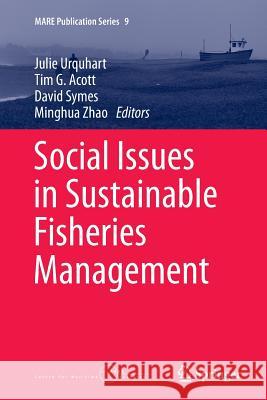Social Issues in Sustainable Fisheries Management » książka



Social Issues in Sustainable Fisheries Management
ISBN-13: 9789402407693 / Angielski / Miękka / 2016 / 355 str.
Social Issues in Sustainable Fisheries Management
ISBN-13: 9789402407693 / Angielski / Miękka / 2016 / 355 str.
(netto: 439,15 VAT: 5%)
Najniższa cena z 30 dni: 458,27
ok. 30 dni roboczych.
Darmowa dostawa!
This volume is an interdisciplinary mix of perspectives and studies on social issues in fisheries from a diverse range of case studies and research disciplines.
1
Introduction: Social issues in sustainable fisheries management
Julie Urquhart, Tim Acott, David Symes&Minghua Zhao
PART I
Issues in governance and co-management
2
Finding Solutions: Resilience theory and Europe’s small scale fisheries
David Symes
3
From boom and bust to local stewardship: a governance benchmark for Celtic sea fisheries management
Mike Fitzpatrick
4
The social dimensions of the Common Fisheries Policy: a review of current measures
GeorgioGallizioli
5
The unfulfilled promise of integrated management: how policy discourses operate in Annapolis Basin, Canada
Kate Bigney Wilner
PART II
Issues in local ecological knowledge and scientific evidence
6
Stewardship and the recovery of threatened wolffish in East Canadian waters
Kathleen Blanchard, Jennifer Dawe& Russell Wall
7
Building bridges among scientists and fishermen with participatory action research
Steve Mackinson& Douglas Clyde Kongshøj Wilson
PART III
Issues in sustaining fisher livelihoods
8
Ghost boats and human freight:The social wellbeing impacts of the salmon ban on Lough Foyle's fishing communities
Easkey Britton9
Fisheries diversification: a case study of French and English fishers in the Channel
Richard Morgan, Marie Lesueur& Laura-Mars
Henichart
183
10
Area-based local development – a new opportunity for European fisheries areas
UrszulaBudzich-Szukala
PART IV
Issues in gender roles
11
Flemish fishermen’s wives: their lives and roles in fisheries
KatrienVervaele
12
Women’s organisations in fisheries and aquaculture in Europe: history and future propects
Katia Frangoudes& José J. Pascual-Fernàndez
13
Women in English fisheries: roles, contributions, barriers and prospects
Minghua Zhao, Marilyn Tyzack, Rodney Anderson &EjirogheneEsteraOnoakpovike
PART V
Issues in social identity and cultural heritage
14
Sense of place and socio-cultural values in fishing communities along the English Channel
Tim Acott& Julie Urquhart
15
Heritage, skills and livelihood: reconstruction and regeneration in a Cornish fishing port
Tim Martindale
16
The socio-cultural impact of industry restructuring: fishing identities in northeast Scotland
Ruth Williams
17
Perspectives about the sea in the Azores:Respecting narratives that sustain inshore fishing communities
Alison L. Neilson, Rosalina Gabriel, Ana MouraArroz&EnésimaMendonca
CONCLUSION
18
Towards an understanding of social issues in sustainable fisheries management
Tim Acott, Julie Urquhart,Minghua Zhao.
Dr Julie Urquhart is a rural geographer and social scientist at the School of Science, University of Greenwich, UK. She graduated with a First Class BSc (Hons) in Environmental Science from the University of Greenwich and further achieved a distinction in a MA in Research Methods (for Countryside Planning) and a PhD in forest policy and economics in 2009 at the Countryside and Community Research Institute (University of Gloucestershire). Julie has been involved in research contracts for UK government agencies on a range of rural issues, including the social impacts of England's inshore fishing industry, the impacts of woodland management on public benefits in forests and the socio-economic impacts of heritage in National Parks. She has worked on a 3 year multidisciplinary European research project CHARM III, exploring the social and cultural impacts of marine fishing on coastal communities in England and France, and is currently co-investigator on a €4.6 million ERDF co-financed Interreg IVA project GIFS, the Geography of Inshore Fishing and Sustainability.
Dr Tim Acott graduated with a BSc Hons in Environmental Science from the University of Plymouth in 1989. He subsequently completed a PhD at the University of Stirling and started to lecture at the University of Greenwich in 1993. Tim was a lead investigator on a European INTERREG 4a funded collaborative project, CHARM III (Channel Integrated Approach for Marine Resource Management). Tim’s work explores the contribution of marine fishing to sense of place and identity in coastal communities on both sides of the English Channel. Tim is also currently the principal investigator on a €4.6 million ERDF co-financed Interreg IVA project called Geography of Inshore Fishing and Sustainability (GIFS). Tim has worked on social science research projects spanning marine fishing, environmental conservation, sustainable tourism, ecotourism and environmental ethics.
David Symes is currently a Reader Emeritus at the University of Hull. He graduated from Oxford University in 1956 and has published extensively in the fields of regional development, rural sociology ad fisheries goverance with a particular emphasis on Europe. He has acted as adviser/consultant on fisheries governance to the European Commission, OECD, UK governments and statutory conservation bodies – most recently on the Scottish Government inquiry on the Future of Fisheries Management in Scotland.
Dr Minghua Zhao is a maritime sociologist who is the Deputy Director of Greenwich Maritime Institute (GMI), University of Greenwich. At GMI, she leads the International Maritime Policy and MBA Maritime Management postgraduate programmes and also heads the China Maritime Centre. Her research interest focuses on maritime labour and gender issues in world commercial shipping and fisheries.
This volume is an interdisciplinary mix of perspectives and studies on social issues in fisheries from a diverse range of case studies and research disciplines. The case is made regarding the dearth of attention to socio-cultural considerations which to date have been largely treated as an externality of fisheries policy. It will be valuable to researchers and decision makers interested in understanding the social dimension of fisheries and provides a timely and relevant compilation of research and analysis on some of the critical socio-cultural issues facing fisheries management and fishing communities today.
1997-2026 DolnySlask.com Agencja Internetowa
KrainaKsiazek.PL - Księgarnia Internetowa









